The term nostalgia was coined in 1688, but it has only been in the last quarter century that scholars have begun to systematically study this phenomenon and how the human tendency to longingly reflect on past experiences influences psychological functioning. Recent research has revealed that nostalgia is not merely a sentimental indulgence, but a powerful psychological resource. Nostalgic reflection gives people comfort when they are emotionally distressed and inspires them to make choices and pursue goals that improve their well-being. Nostalgic memories also serve as a guide when people are looking to make life changes that will help them achieve a greater sense of meaning.
Though psychologists and other researchers are discovering that nostalgia has many psychological benefits, a critical question remains: Do ordinary Americans view nostalgia as a psychological resource that can help them improve their lives? To explore this question, our team at the Human Flourishing Lab surveyed a nationally representative sample of just over 2,000 American adults about how they experience and use nostalgia. We also asked participants to share a nostalgic memory, some of which are included in this report.
KEY INSIGHTS
- Most Americans (73%) agree that their nostalgic memories are best characterized as social memories involving family, romantic partners, or close friends.
- Young adults are the most likely to characterize their nostalgic memories as non-social; nearly one-quarter of adults under 30 report that their nostalgic memories generally involve experiences in which they were alone or doing something by themselves.
- Most Americans (84%) agree that nostalgic memories serve as reminders of what is most important in their lives.
- Most Americans agree that when life is uncertain or difficult, nostalgic memories are a source of comfort (77%) and inspiration (72%).
- Nearly 60% of Americans believe that nostalgic memories offer guidance when they are not sure what direction to take in life.
- Older adults are more likely than younger adults to view nostalgic memories as reminders of what is most important in life and as sources of comfort, inspiration, and guidance. However, the majority of adults in every age group hold these beliefs about nostalgia.
INTRODUCTION
In popular culture, nostalgia is often treated as a sentiment primarily linked to consumer behavior and aesthetic preferences. Indeed, many people enjoy listening to music, watching movies and television programs, playing video games, eating food, and purchasing products reminiscent of their childhood and youth. However, nostalgia is much more than an attraction to retro-themed products, styles, and experiences. In fact, nostalgic entertainment often connects to a deeper quest for belonging and meaning.
In my forthcoming book, Past Forward: How Nostalgia Can Help You Live a More Meaningful Life, I explore the profound role that nostalgia plays in helping people navigate life’s uncertainties and challenges, leading to a more fulfilling existence. I also offer specific suggestions for harnessing the power of nostalgia to reduce mental distress, cultivate and strengthen relationships, identify and pursue meaning-providing goals, and live more intentionally.
I have spent more than two decades conducting research on nostalgia and collaborating with businesses and non-profit organizations looking to tap into its power to improve their products and services and to better connect with their employees, clients, and customers. During this time, I have come to view nostalgia as a future-oriented experience. Most people understandably think of nostalgia as a past-oriented experience because it involves thinking about the past. However, a growing body of research from the field of psychology and related social and behavioral sciences is revealing that nostalgic reflection energizes future-oriented goals and actions by focusing people’s minds on cherished experiences, typically shared with loved ones, that instill a sense of meaning in life.
Nostalgic reflection is especially useful when people are facing distressing mental states such as sadness, loneliness, anxiety, low self-esteem, and meaninglessness. These mental states are not only unpleasant to experience, but they can also be demotivating, leading individuals to withdraw from other people and the aspirations and activities that help them, their families, and their communities thrive. Nostalgic reflection reminds them that even though they are currently going through a challenging time, life is much bigger than their present difficulties, and it is full of meaning-providing experiences. This has the effect of restoring well-being and inspiring a hopeful mindset. For example, studies find that loneliness triggers nostalgia; nostalgic reflection serves as a reminder of previous socially fulfilling experiences, which makes individuals feel more socially connected, competent, and motivated to restore or strengthen existing social bonds or cultivate new relationships.
Moreover, when individuals are struggling to make important life decisions or are looking to make changes to improve their lives, their nostalgic memories offer critical clues for forging a path forward. To determine what choices to make and goals to prioritize, it is very helpful to look to one’s most meaningful memories for guidance.
Psychologists and other researchers are using the tools of cognitive, behavioral, and social science to discover the many ways in which nostalgia serves as a powerful psychological resource. However, the extent to which the general public views nostalgia as a resource they can use to better their lives remains unknown. Do Americans know that their nostalgic memories can illuminate what is most important in their lives, offer solace and inspiration in challenging times, and provide direction when they feel lost? To find out, our team at the Human Flourishing Lab surveyed a nationally representative sample of just over 2,000 American adults about how they experience and utilize nostalgia.
Just today watching Family Guy: The episode referenced the ‘90s, and I thought about growing up in the ‘90s—the clothing we wore, the hairstyles, and the fun days spent as a kid outdoors with no electronics.
Watching the show took me back to those days. – Male | Age 33
THE CONTENT OF NOSTALGIC MEMORIES
Research finds that nostalgic memories are deeply social memories. They typically involve close relationships such as family, romantic partners, or friends. In the current survey, we asked participants to select one of three themes that best captures the general nature of their nostalgic memories. This allowed us to further explore the social nature of nostalgia and to examine if the general content of people’s nostalgic memories relates to their views of nostalgia as a psychological resource.
For nearly three-fourths of Americans, nostalgic memories are about relationships with family, romantic partners, and close friends. And when nostalgia isn’t about close relationships, it is more likely to involve solitary experiences than social experiences involving strangers or casual acquaintances. We also explored how age and gender potentially influence nostalgia themes among American adults. Age is especially important to consider because of its natural association with the accumulation of life experiences. Not only do people have more total life experiences to draw from as they get older, but they also have more diverse life experiences.
There are some differences across age and gender. Older adults and women are the most likely to characterize their nostalgic memories as being about family, romantic partners, and close friends. Most notably, nearly one-quarter of adults under 30 characterize their nostalgic memories as generally involving experiences in which they are alone, compared to 12 percent of adults 60 and older. However, for most men and women, regardless of age, nostalgic memories feature loved ones.
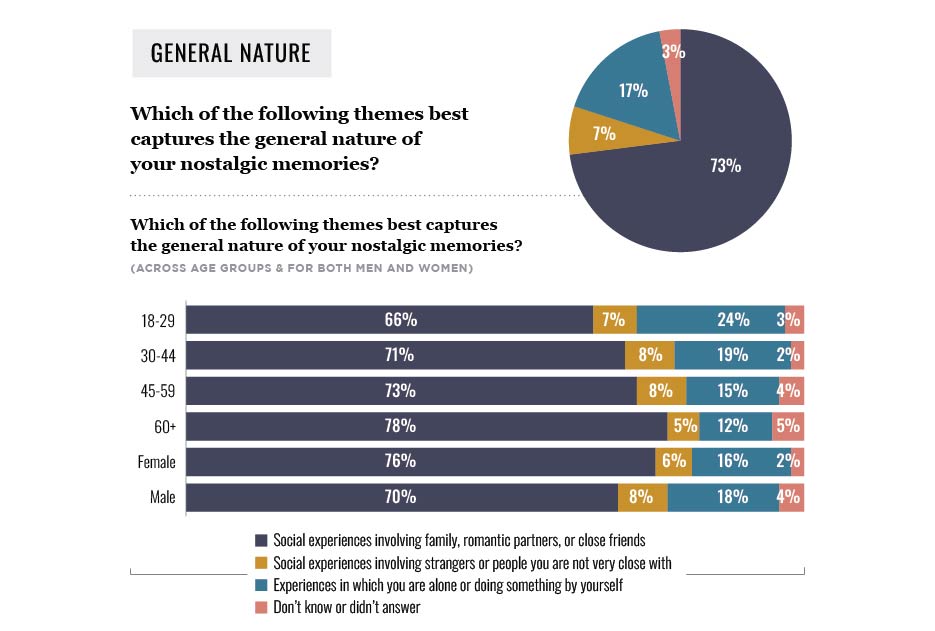


NOSTALGIA AS A PSYCHOLOGICAL RESOURCE
A growing body of research indicates that nostalgia is a vital psychological resource for human flourishing. Distressing mental states such as sadness, loneliness, and low self-esteem increase nostalgia, while nostalgic reflection increases positive mood, feelings of social connectedness, self-esteem, and other indicators of psychological well-being. Moreover, studies find that nostalgia has motivational power. It makes people feel more energized, confident, and inspired to pursue life goals.
Though researchers have discovered that nostalgia has many psychological benefits, it is unclear if the public understands the many ways that nostalgia helps them flourish. In popular culture, nostalgia is often treated as a form of escapist entertainment. Consumer trends clearly indicate that Americans have a strong appetite for nostalgia-themed products, services, experiences, and media content. But do Americans have a deeper appreciation of nostalgia as a well-being and motivational resource?
To examine this, survey participants were asked to report their agreement with a series of statements regarding how they use nostalgia in their own lives. First, do Americans believe that nostalgia reminds them of what is most important in their lives?
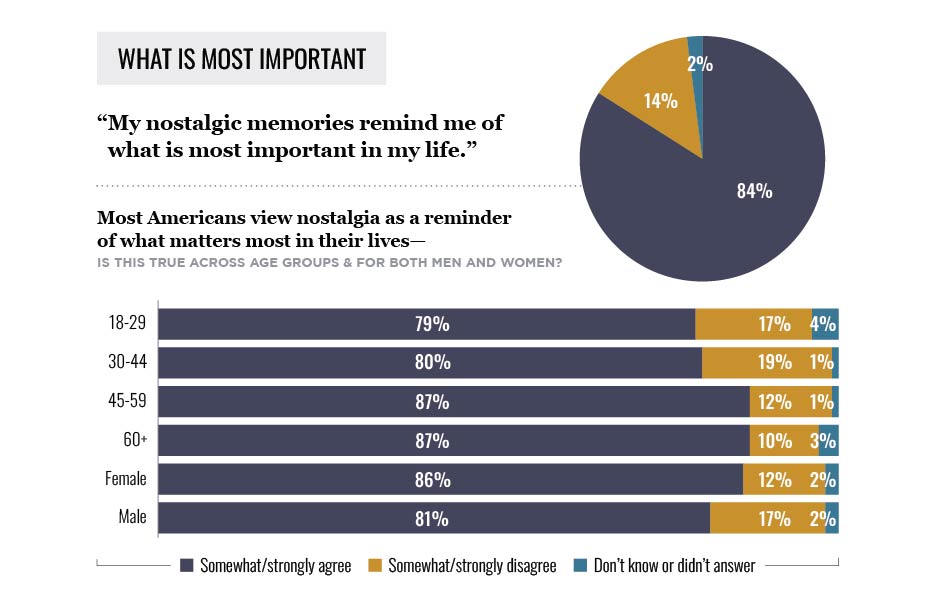

Though there are differences between age groups, the fact that nearly 80 percent or more of American adults across age and gender categories agree that nostalgic memories are a reminder of what is most important in life indicates that people generally view nostalgia as an existential resource. Nostalgic memories focus men and women of all ages on what gives their lives meaning.
Research finds that people become more nostalgic when they are experiencing unpleasant psychological states and that nostalgia serves to restore well-being during these challenging times. Do Americans have a good understanding of nostalgia as a source of psychological comfort?
Americans, regardless of age or gender, largely agree that nostalgia has a comforting effect when life is uncertain or difficult. Though the percentage of people who view nostalgia as a source of comfort increases with age, most young adults also appreciate that nostalgia provides solace during challenging times.
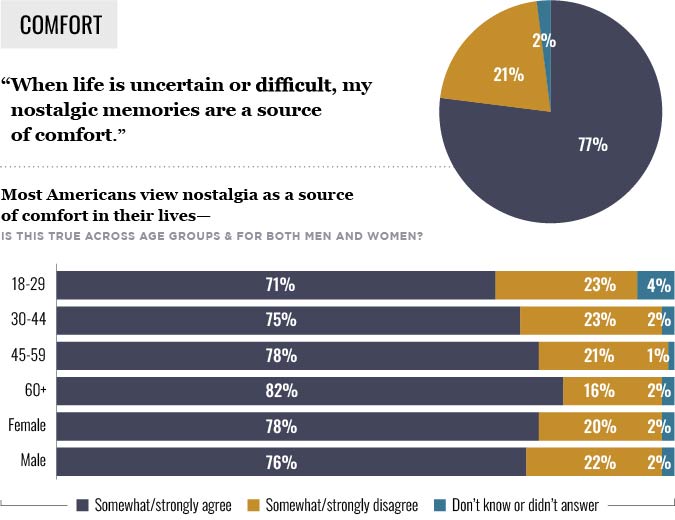

Research further finds that nostalgia does more than offer psychological comfort. It inspires action. Do Americans think of nostalgia as a source of inspiration?
Americans, regardless of age or gender, also largely agree that nostalgia provides inspiration when life is uncertain or difficult. Older adults are more likely than young adults to hold this view, but most young adults also consider nostalgic memories to have inspirational power.
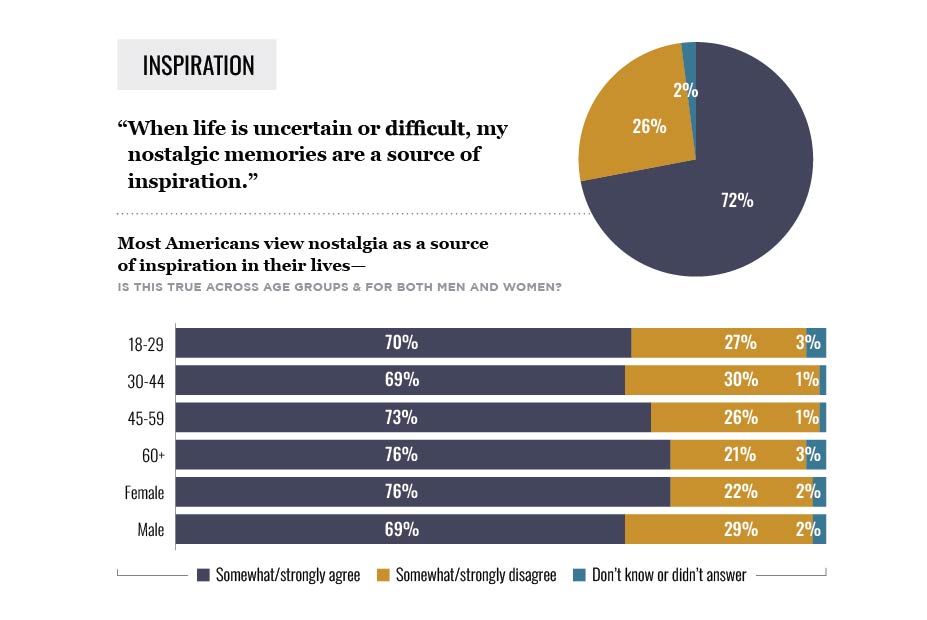

Since nostalgia reminds people of what is most important in their lives, it can help them make major life decisions. In other words, in addition to inspiring people to take action to improve their lives, it can help them determine what direction to take. Do Americans view nostalgia as offering guidance in their lives?
Similar to other findings in this survey, the percentage of people who hold this future-oriented view of nostalgia increases with age. However, despite having fewer past experiences to draw from than older adults, over half of young adults believe their nostalgic memories can help guide them when they aren’t sure what path to take in life.
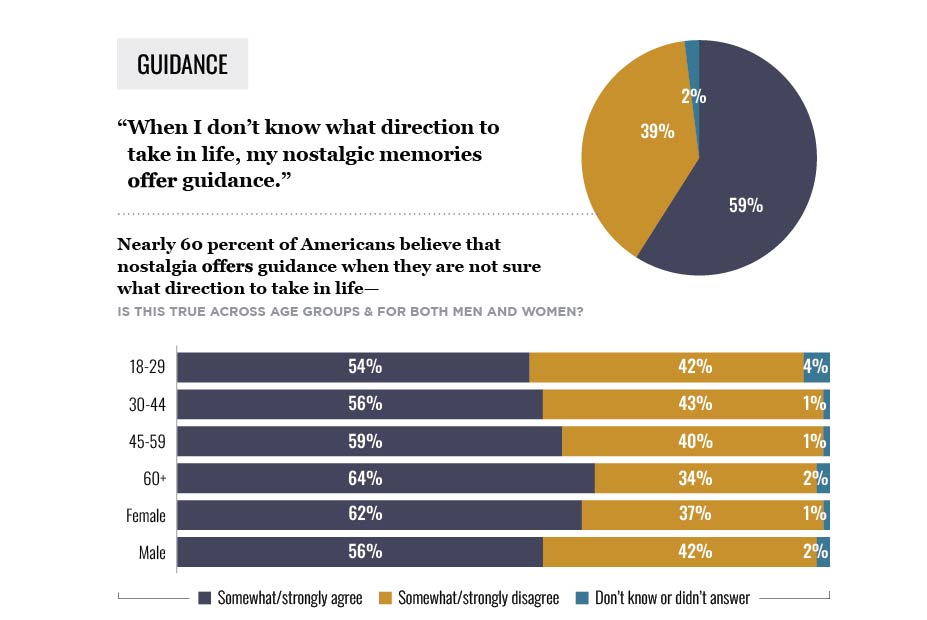

Does the general theme of people’s nostalgic memories relate to their view of nostalgia as a psychological and motivational resource?
Research indicates that nostalgia is most effective at improving well-being and increasing goal motivation when it is focused on close social relationships. This suggests that people whose nostalgic memories generally involve social experiences with family, romantic partners, and close friends should be the most likely to find nostalgia to be psychologically beneficial.
To explore this possibility, I divided survey participants into groups based on the theme they selected as generally reflecting the nature of their nostalgic memories and compared each group on their agreement with the statements concerning nostalgia as a reminder of what is important in life and as a source of comfort, inspiration, and guidance.
Individuals whose nostalgic memories generally focus on social experiences involving family, romantic partners, or close friends are more likely than those in each of the other nostalgia theme categories to think that nostalgia serves as a reminder of what is important in life, offers comfort when life is difficult or uncertain, offers inspiration when life is difficult or uncertain, and offers guidance when the direction in life to take is unknown.
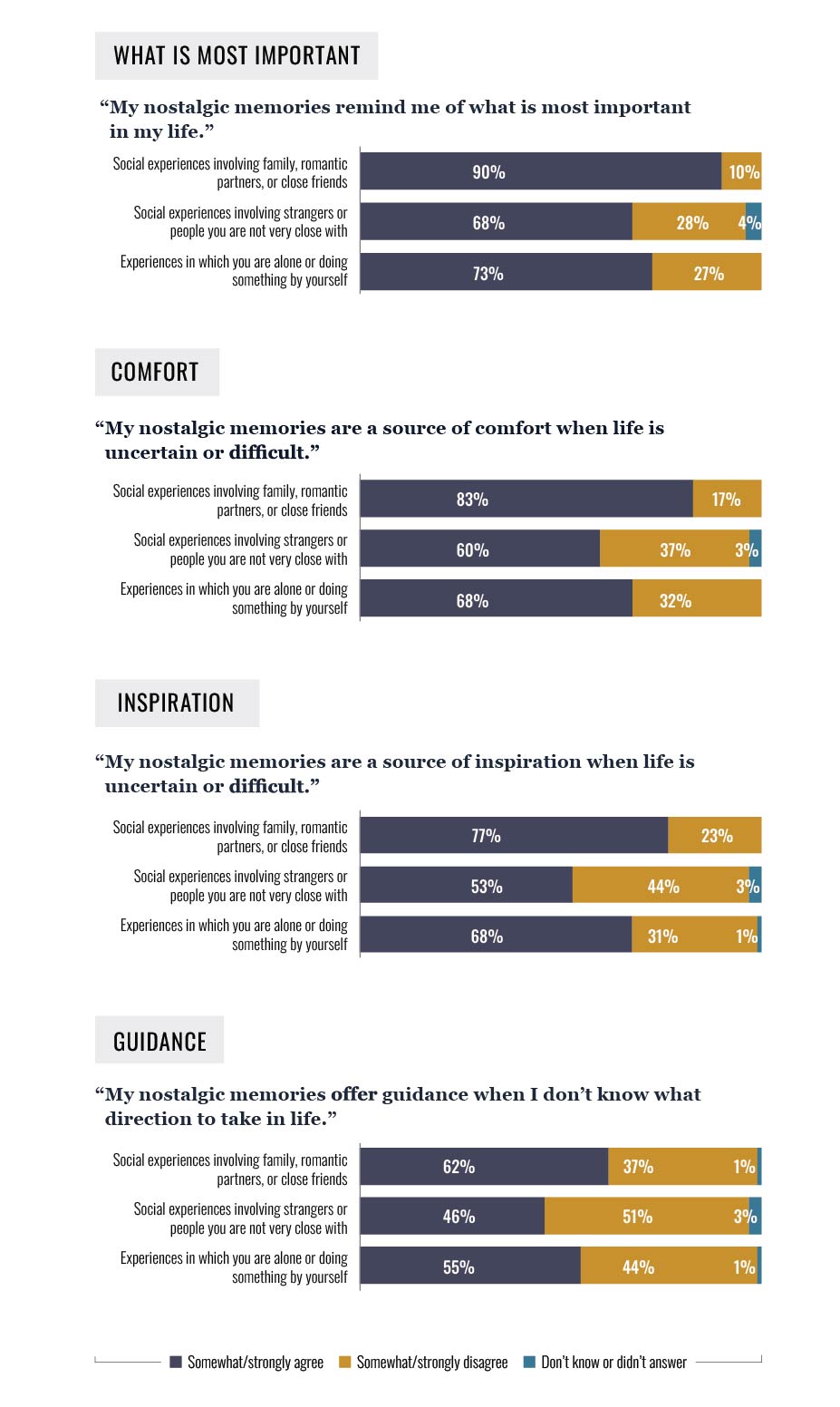
CONCLUSION
Consistent with previous research, for most American adults, nostalgic memories are deeply social memories. Importantly, Americans value nostalgia as a psychological resource. With age comes a greater appreciation for nostalgia, but most young adults understand that their nostalgic reflection has numerous benefits.
The general theme of people’s nostalgic memories is strongly related to their views of nostalgia as a psychological and motivational resource. Individuals whose nostalgic memories are about close relationships (family, romantic partners, and friends) are the most inclined to view nostalgia as a reminder of what is important in life and as a source of comfort, inspiration, and guidance. These findings are consistent with research indicating that a major reason nostalgia boosts well-being and motivation is because it focuses people’s minds on the deep social bonds that give their lives meaning.
There are Americans who do not view nostalgia as a useful resource for improving their lives. It is possible that nostalgia isn’t helpful for everyone. However, many of the people who doubt its value may not realize just how much they use nostalgia in their own lives. And some have a negative attitude about nostalgia that isn’t based on evidence but instead on the myths that nostalgia is just a form of escapist entertainment, a mental weakness, or a barrier to personal growth. The more people learn about the psychological benefits researchers are discovering, the more they may be able to utilize nostalgia to improve their lives and the world around them.
METHODOLOGY
For this survey, we partnered with NORC at the University of Chicago and its AmeriSpeak® panel. Ameri- Speak® is a probability-based panel designed to represent the US household population. Randomly selected US households are sampled using area probability and address-based sampling, with a known, nonzero probability of selection from the NORC National Sample Frame. The nationally representative sample consisted of 2,049 respondents. The survey was conducted October 5-9, 2023.

A project of the Archbridge Institute
The Archbridge Institute is a non-partisan, independent, 501(c)(3) public policy think tank. Our mission is to lift barriers to human flourishing.
Sign Up For Our Newsletter
Contact
Archbridge Institute
1633 Connecticut Ave. NW, Suite 300,
Washington, DC 20009

